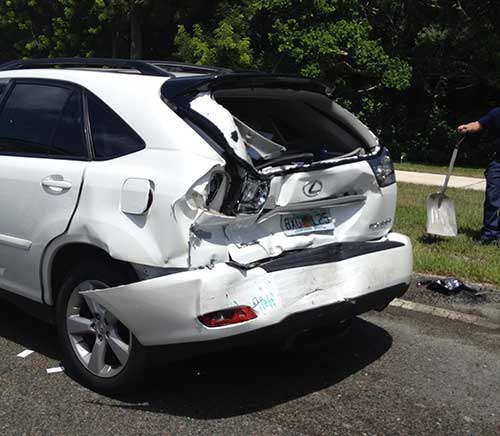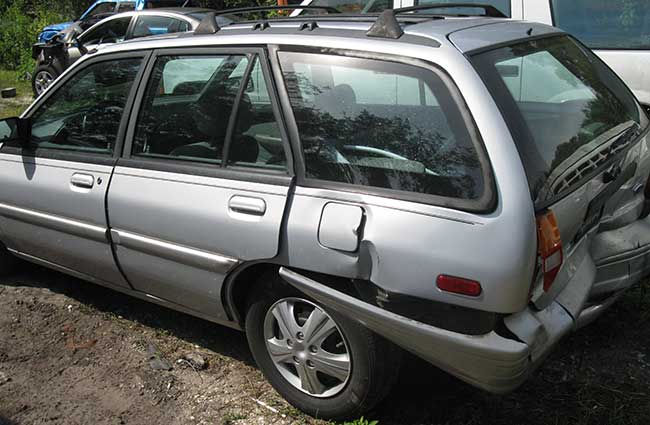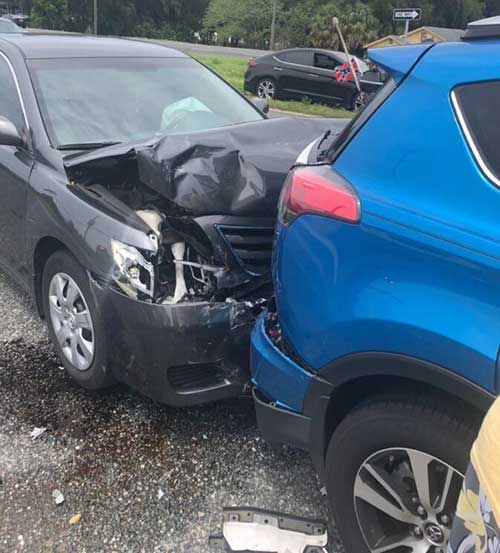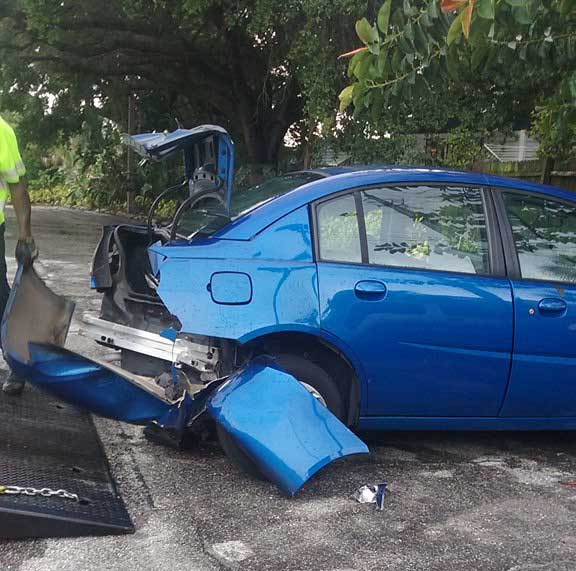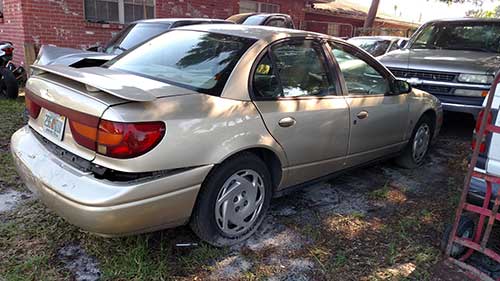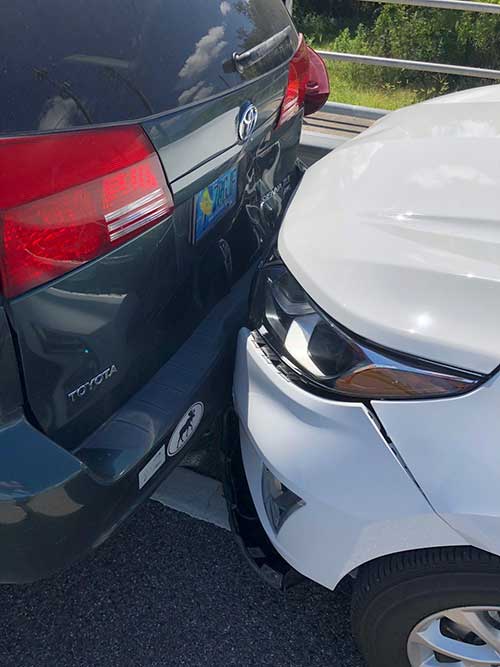Rear-ended in Florida? Here’s how this article will help you understand the factors that most impact the potential settlement amount for your injuries and damages.
Average Settlement for a Rear-End Collision in Florida
It’s important to understand that if you’re presenting a claim after being rear-ended, the settlement amount will vary in each case.
Are you wondering, “I got rear-ended, how much money will I get?” How much compensation you get for a Florida rear end collision settlement varies based on the unique circumstances of each situation and the severity of your injuries. Based on our own settlement data on this page, the average settlement for a rear end collision is between $100,000 to $875,000.
Florida rear-end collisions can leave unsuspecting victims with multiple injuries. Some of the most common injuries in these accidents can occur to the neck, back, head, and rotator cuff.
Most people think about head and neck injuries in a rear-end accident. However, they may not realize their shoulder pain may also be related. If you injured your rotator cuff in a car accident, you might be entitled to reimbursement for your damages as well as your pain and suffering.
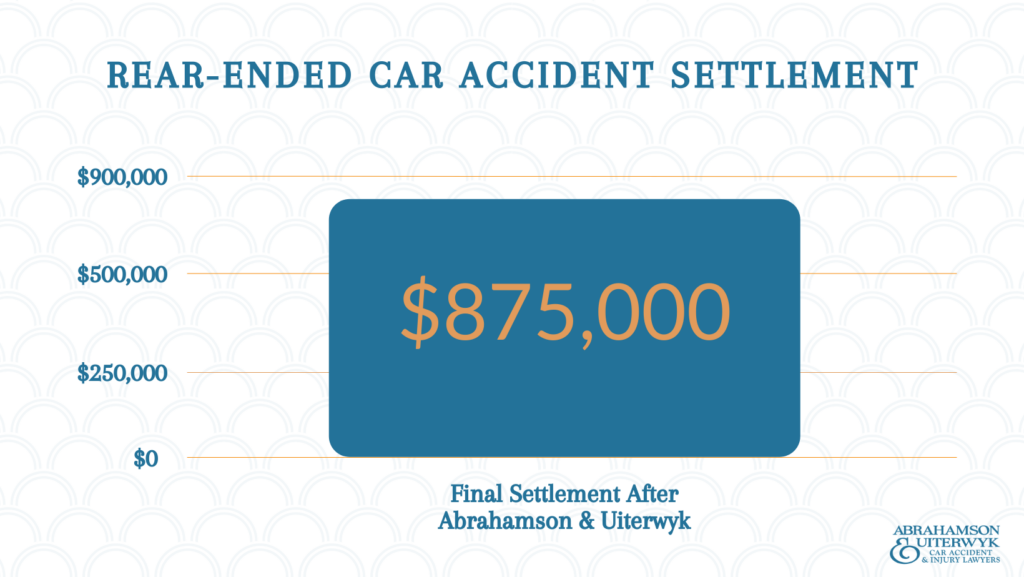
When you retain a professional Florida car accident attorney, we will help you fight for compensation for all of your injuries, time off work, pain and suffering, and more.
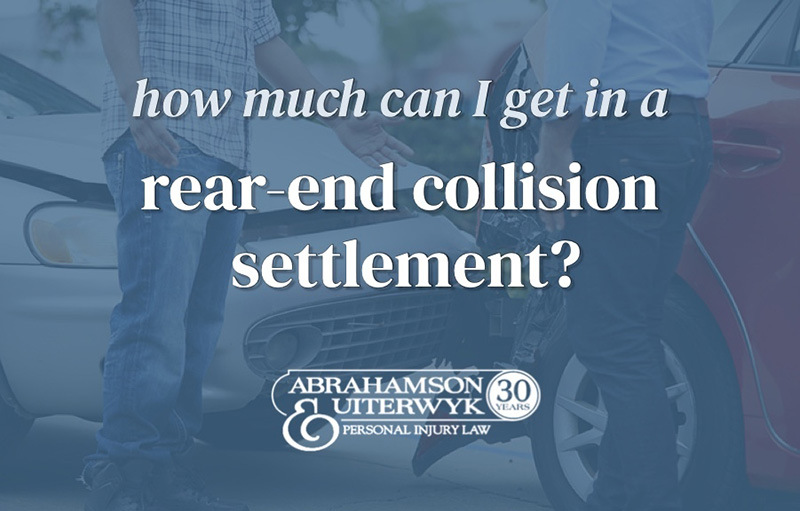
Photos of Rear-End Collisions Involving Our Injury Clients
What Types of Injuries are Most Common in Florida Rear-End Collision Accidents?
Depending on the severity of the collision, the types of injuries will differ. Some of the most common ones include head, neck, back, and shoulder injuries.
Concussions can happen regularly in rear-end collisions as your head may strike something in the vehicle. Head injuries are not always immediately apparent either. Sometimes it can take 24 hours for someone to realize they have a concussion.
In more severe collisions, you may suffer a traumatic brain injury. Symptoms like headaches, blurry vision, sensitivity to light, or an inability to concentrate can be telltale signs of a head injury.
Many plaintiffs overlook their shoulder pain and mistakenly assume it’s just sore. Torn rotator cuffs are painful and more common than people realize in rear-end accidents. Symptoms of a rotator cuff tear include:
- Shoulder and muscle weakness;
- Radiating pain down your arm;
- Limited range of motion in your shoulder;
- Clicking or popping sound when you move the painful shoulder;
- Struggling to raise your arm above your head;
- Swelling in your shoulder area;
- Neck or upper back pain; and
- Severe or sudden pain on the outer side of your shoulder.
Your back and neck pain may only be soft tissue damage, or there could be something more serious going on. Having x-rays and even MRIs may be necessary to determine the extent of your injuries.
Spinal injuries may be severe and cause pinched nerves, leaving you in excruciating pain and unable to walk. If conservative treatment options fail, you may need steroid injections or even surgery.
How Does the Type of Injury Sustained Impact the Amount of my Florida Rear-End Accident Settlement?
The type of injury you sustained will impact the overall rear-end accident settlement value in multiple ways. Your amount of medical bills is a primary example.
Consider someone who has $200,000 in medical bills compared with someone who has $2,000 in bills. The plaintiff with several hundred thousand in bills will be asking for far more than the other person.
Some injuries are more serious and therefore may be entitled to a higher dollar amount for pain and suffering.
Someone who suffered only a mild case of whiplash will not receive the same settlement as someone who had to undergo multiple neck and back surgeries.
Case values are based on a combination of other factors as well, such as loss of earnings, future treatment, disability, and physical vehicle damages. This is why no two rear-end collision settlements are the same.
Is the Driver Who Rear-Ends the Other Vehicle Always at Fault?
No, the driver who rear-ends someone isn’t necessarily at fault. One common example of this is with a multi-car rear-end collision. The car that rear-ended you may have been pushed into you by the vehicle behind them.
There are several other situations where the driver who rear-ends the vehicle in front is not entirely at fault. Perhaps the front vehicle suddenly reverses, or it has no working brake lights and stops suddenly.
Or perhaps the front vehicle broke down and the driver didn’t put their emergency flashers on or try to pull the vehicle off the road. In situations like this, the driver in front may be at least partially at fault for the accident.
What Evidence Is Most Critical in Determining Fault in a Rear-End Collision?
Determining fault in a rear-end collision is not always straightforward. While skid marks, witness statements, and scene photos are important pieces of evidence, they don’t always tell the whole story. Sometimes you need an expert to review the physical vehicle damages and witness statements.
This can be accomplished by retaining an accident reconstructionist. These experts conduct a thorough review of the accident and provide a scientific answer as to how the collision occurred.
They may also go as far as recreating the accident to duplicate the crash conditions in a controlled environment. The use of experts is typically reserved for cases with severe injuries and/or disputed liability.
What Are Some Examples of Florida Rear-End Accident Settlements That Abrahamson & Uiterwyk Has Handled?
Our highly-experienced Florida car accident lawyers have handled numerous rear-end collision cases in our over 35 Years of experience. Many of these cases were resolved with six-figure settlements for our clients.
$100,000 Rear-end collision settlement in Florida
Our client was stopped at a red light in Pasco County, when a full size pick up truck rear ended her. Shortly after the impact she began to experience intense neck and upper shoulder pain. She called Abrahamson and Uiterwyk to represent her in her claim against the defendant and his insurance company, Farmer’s Insurance, and we quickly referred her to an orthopedic doctor.
While under the care of the orthopedic doctor, our client was diagnosed with a large herniated disc in her cervical spine. Our client received several surgical injections in her neck and upper shoulders to alleviate her pain. Unfortunately, the damage to her neck was so severe, that the shots were not effective. The client was re-evaluated by the orthopedic doctor and ultimately underwent a total disc replacement in her cervical spine.
Following the surgery, the defendant’s insurance company, Farmer’s Insurance, was presented with the client’s medical records along with a time limit demand that they tender their policy limits of $100,000. Within that short time limit, we convinced Farmer’s Insurance that it was in their insured’s best interest to settle the case now, before costly litigation and Farmer’s Insurance agreed to pay the $100,000 policy limits. The client was happy that the case resolved quickly and efficiently, and for the maximum recovery we were able to obtain.
Here are several other rear-end collision settlement examples are:
- $875,000 for a 36-year-old female who suffered cervical and lumbar spine injuries;
- $750,000 for a client who sustained multiple injuries;
- $550,000 for a client who suffered severe injuries after the defendant failed to observe stopped traffic ahead;
- $525,000 for a 62-year-old man who had multiple surgeries to repair shoulder and cervical spine injuries after a serious rear-end collision;
- $500,000 for a 21-year-old passenger injured in a rear-ended vehicle who sustained herniations to their neck and back that required injections and surgery; and
- $500,000 for a 52-year-old male who required a lumbar discectomy after being rear-ended by a limo and subsequently pushed into another vehicle. You can find out more information about the average settlement for discectomy here.
This list is a small representation of the rear-end accident settlements we’ve handled over the last three decades. When you retain Abrahamson & Uiterwyk, we will complete a case evaluation right away.
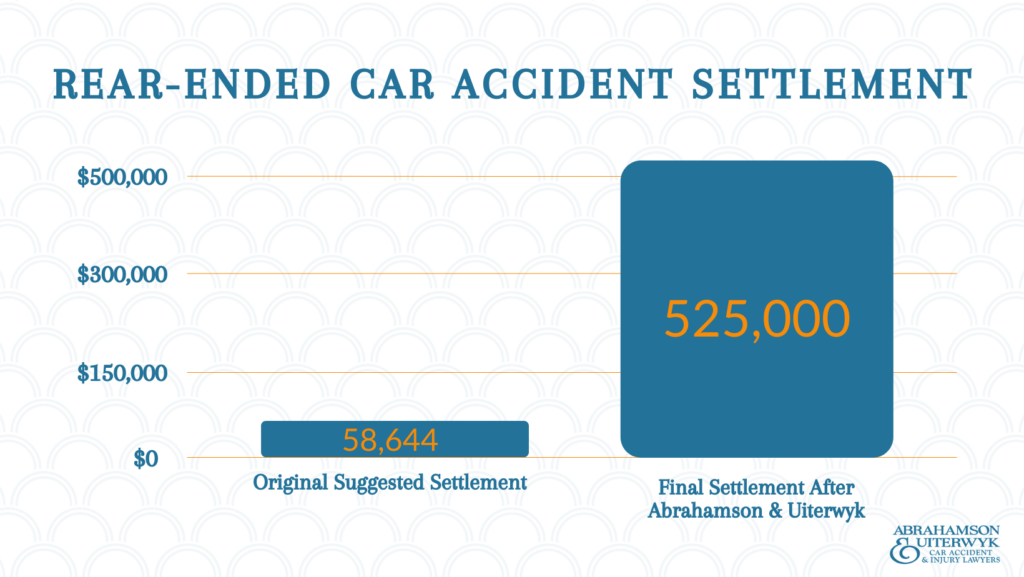
What Factors Does a Lawyer Consider When Deciding Whether to Take a Rear-End Accident Case?
Numerous factors play into the decision on whether we take a case. One of the most important factors is when the accident occurred. If the accident was recent, you will be well within the statute of limitations.
But what about a case that has been in negotiations for over three years already? There is a chance the two-year statute of limitations has passed. This means that the courts would bar your claim, and it is likely that an attorney will decline the case.
Your personality and believability are essential criteria that firms look at. You may not come across as believable, or it may appear that you’re lying about the facts of the accident. Have other firms declined to take your case? Those are all red flags an attorney will consider before agreeing to take on your case.
The probability of winning your case is also something attorneys look at. You may think your case is a slam dunk, but attorneys have more insight on whether a case is worth pursuing based on their knowledge of past Florida rear-end collision lawsuits.
The potential legal fees may outweigh the settlement value. Or the defendant may have limited resources, so there is little probability of collecting on a judgment.
In rare cases, an attorney may not be able to take your case because they have a conflict of interest. Perhaps, for example, they have represented the defendant in the past.
Injured in a rear-end accident? Our Tampa rear-end collision lawyers are ready to help.
Contact a Florida Rear End Accident Attorney
Don’t make the mistake of assuming that a Florida rear-end accident claim & settlement is easy to resolve. Let our experienced car accident attorneys help. Contact Abrahamson & Uiterwyk today to schedule a free initial consultation. Our Florida car accident lawyer can help you fight for the settlement you deserve.
What our Happy Clients Say on Google
“Fantastic law group.
Excellent follow up, guidance, and very professional. I would absolutely call upon this firm again if needed.”
Jennifer J.
Rating 5/5 ⭐⭐⭐⭐⭐
Read more of our 320 reviews on Google

